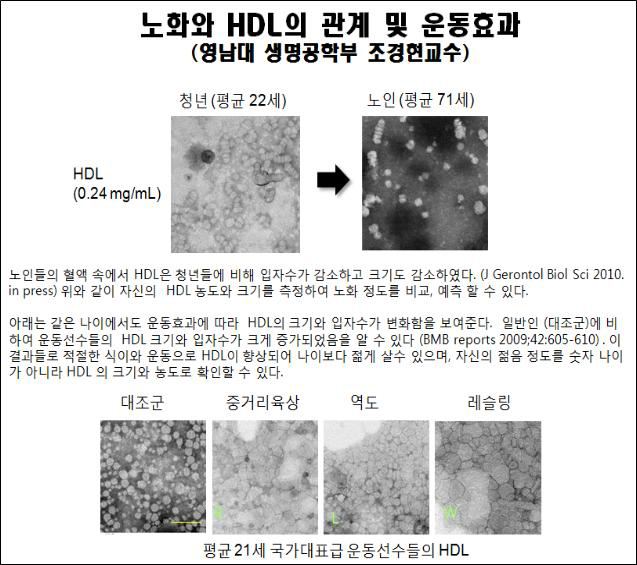"How old are you?"
Published on US SSCI Journal <Journal of Gerontology> while receiving international recognition. Accomplishment in convergence between fundamental research and clinical research.
[April 13, 2010]
Though aging is an inevitable fate for humankind, immortality is also the people's hope. However, one's age is not in direct proportion to the level of aging. Therefore, in order to live a youthful and healthy life, it is crucial to accurately diagnose one's level of aging.
Yeungnam University professors Cho, Kyung-hyun (School of Biotechnology) and Shin, Dong-gu (College of Medicine) teamed up for joint research and became the first in the world to find a key bio-marker for aging in the blood. Using this, they have opened the doors for diagnosing the level of aging in a simple manner.
The research team who are with the 'Yeungnam University Aging-associated Vascular Disease Research Center' (director Kim, Jae-ryong), which is Medical Science Research Center (MRC) supported by MEST and the National Research Foundation of Korea, sampled blood from 60 people to make comparative analyses on senior citizens over 65 years old at an average of 71 years old and youths with an average of 22 for the past 2 years.
In result, they became the first to reveal that antioxidant activities, which suppress aging, and HDL (high density lipoprotein), which is known as 'good cholesterol', were reciprocally proportionate. With more aging, antioxidant activities in lipoprotein within the blood dropped, and that the size and density of HDL also dropped were revealed through their experimentations.
It is already a well known fact that the higher amount of HDL you have in your blood, which acts as a 'blood vessel janitor' that transports cholesterol in tissues to the liver so that it can be excreted, the healthier it is for you. However, this was the first time to reveal that the HDL size and density in blood was more important than its quantity. Furthermore, the research team revealed that proper diets, and aerobic exercises such as swimming and track were very effective for increasing the size and density of HDL, and thus presented a detailed method for suppressing aging (See attachment).
In addition, the research team also discovered that with aging, apolipoprotein, which is an important protein in the blood, started to break for the first time.
The research team reported these research results as an important aging diagnosis marker, and they have already applied for patents on their development of an aging diagnosis kit (Invention: aging diagnosis method and bio-marker for aging diagnosis).

The research results acquired through fundamental and clinical studies were confirmed for publication in the May edition of the ≪Journal of Gerontology≫, which is an SSCI (social sciences citation index) journal, and very rare for a natural science thesis to be published on such. Thus, the importance of the research results were recognized by a globally prominent journal that has been published since 1946 the Gerontological Society of America, with an impact index of 4.003.
Prior to this in January, Professor Cho, Kyung-hyun reported that fructose changed the functions and structure of apolipoprotein existing in the blood, and that it caused and accelerated diabetes, atherosclerosis and aging, while also revealing its scientific mechanism.
Professor Cho, Kyung-hyun (42, School of Biotechnology), who led this research, stated, "When considering that existing aging diagnosis methods that required extraction of cells or tissues not only required complex procedures and high costs, but also had some risks to it, the results of this research will contribute considerably to the popularization of aging diagnosis." He also added, "By applying the blood extraction aging diagnosis method that was newly developed to health check-ups, everyone will be able to easily diagnosis their biological level of aging, and be able to find a way to maintain their youth and health."










